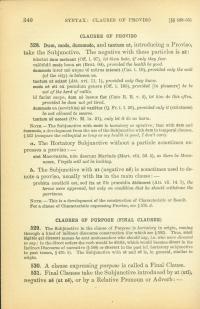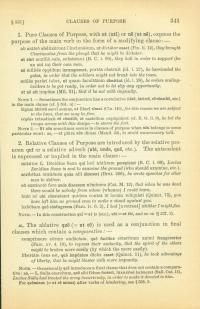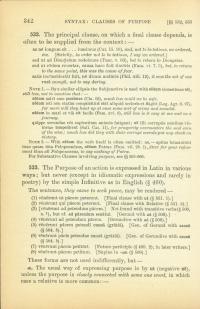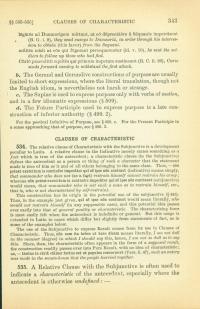Purpose Clauses
529. The subjunctive in the clause of purpose is hortatory in origin, coming through a kind of indirect discourse construction (for which see § 592). Thus, mīsit lēgātōs quī dīcerent means he sent ambassadors who should say, i.e. who were directed to say; in the direct orders the verb would be dīcite, which would become dīcant in the indirect discourse of narrative (§ 588) or dīcerent in the past (cf. hortatory subjunctive in past tenses, § 439.b). The subjunctive with ut and nē is, in general, similar in origin.
530. A clause expressing purpose is called a Final Clause.
531. Final Clauses take the subjunctive introduced by ut (utī), negative nē (ut nē), or by a relative pronoun or adverb.
- Pure clauses of purpose, with ut (utī) or nē (ut nē), express the purpose of the main verb in the form of a modifying clause.
Ab arātrō abdūxērunt Cincinnātum, ut dictātor esset. (Fin. 2.12)
They brought Cincinnatus from the plough that he might be dictator.Ut sintauxiliō suīs, subsistunt. (B. C. 1.80)
They halt in order to support their own men.
(be an aid to)Nē mīlitēs oppidum inrumperent, portās obstruit. (id. 1.27)
He barricaded the gates, in order that the soldiers might not break into the town.scālās parārī iubet, nē quam facultātem dīmittat (id. 1.28)
He orders scaling ladders to be got ready, in order not to let slip any opportunity.ut nē sitimpūne (Mil. 31)
that it be not with impunityNote 1— Sometimes the conjunction has a correlative (ideō, idcircō, eō cōnsiliō, etc.) in the main clause (cf. § 56.a).
Lēgum idcircō servī sumus, ut līberī sīmus. (Clu 146)
For this reason we are subject to the laws, that we may be free.Cōpiās trānsdūxit eō cōnsiliō, ut castellum expūgnāret. (cf. B. G. 2.9)
He led the troops across with this design—to storm the fort.Note 2— Ut nōn sometimes occurs in clauses of purpose when nōn belongs to some particular word.
- Relative clauses of purpose are introduced by the relative pronoun quī or a relative adverb (ubi, unde, quō, etc.). The antecedent is expressed or implied in the main clause.
Mittitur L. Dēcidius Saxa quī locī nātūram perspiciat. (B. C. 1.66)
Lucius Decidius Saxa is sent to examine the ground (who should examine, etc.).Scrībēbat ōrātiōnēs quās aliī dīcerent. (Brut. 206)
He wrote speeches for other men to deliver.eō exstīnctō fore unde disceremnēminem (Cat. M. 12)
that when he was dead there would be nobody from whom I could learn.
(whence)Huic nē ubi cōnsisteret quidem contrā tē locum relīquistī. (Quinct. 73)
You have left him no ground even to make a stand against you.habēbam quō cōnfugerem (Fam. 4.6.2)
I had [a retreat] whither I might fleeNote— In this construction quī = ut is (etc.), ubi = ut ibi, and so on (§ 537.2).
a. The ablative quō ( = ut eō) is used as a conjunction in final clauses which contain a comparative.
comprimere eōrum audāciam, quō facilius cēterōrum animī frangerentur (Fam. 15.4.10)
to repress their audacity, that the spirit of the others might be broken more easily
(by which the more easily)
Lībertāte ūsus est, quō impūnius dicāx esset. (Quinct. 11)
He took advantage of liberty, that he might bluster with more impunity.
Note— Occasionally quō introduces a final clause that does not contain a comparative.
L. Sulla exercitum, quō sibi fīdum faceret, lūxuriōsē habuerat. (Sall. Cat. 11)
Lucius Sulla had treated the army luxuriously, in order to make it devoted to him.
For quōminus ( = ut eō minus) after verbs of hindering, see § 558.b.
532. The principal clause, on which a final clause depends, is often to be supplied from the context.
ac nē longum sit . . . iussimus (Cat. 3.10)
and, not to be tedious, we ordered, etc.
[Strictly, in order not to be tedious, I say we ordered.]
sed ut ad Dionȳsium redeāmus (Tusc. 5.63)
but to return to Dionysius
Sed ut eōdem revertar, causa haec fuit timōris. (Fam. 6.7.3)
But, to return to the same point, this was the cause of fear.
Satis incōnsīderātī fuit, nē dīcam audācis. (Phil. 13.12)
It was the act of one rash enough, not to say daring.
Note 1— By a similar ellipsis the subjunctive is used with nēdum, sometimes nē (still less, not to mention that).
nēdum salvī esse possīmus (Clu. 95)
much less could we be safe
Nēdum istī nōn statim conquīsītūrī sint aliquid sceleris et flāgitī. (Leg. Agr. 2.97)
Far more will they hunt up at once some sort of crime and scandal.
Nēdum in marī et viā sit facile (Fam. 16.8)
Still less is it easy at sea and on a journey.
Quippe secundae rēs sapientium animōs fatīgant; nē illī corruptīs mōribus victōriae temperārent. (Sall. Cat. 11)
For prosperity overmasters the soul even of the wise; much less did they with their corrupt morals put any check on victory.
Note 2— With nēdum the verb itself is often omitted.
aptius hūmānitātī tuae quam tōta Peloponnēsus, nēdum Patrae (Fam. 7.28.1)fitter for your refinement than all Peloponnesus, to say nothing of Patræ.
For Substantive Clauses involving Purpose, see §§ 563 - 566.
533. The purpose of an action is expressed in Latin in various ways; but never (except in idiomatic expressions and rarely in poetry) by the simple Infinitive as in English (§ 460). The sentence, They came to seek peace, may be rendered:
- Vēnērunt ut pācem peterent.[Final Clause with ut (§ 531.1)]
- vēnērunt quī pācem peterent. [Final Clause with Relative (§ 531.2)]
- [vēnērunt ad petendum pācem.] Not found with transitive verbs (§ 506, Note 2), but cf. ad pārendum senātuī. [gerund with ad (§ 506)]
- vēnērunt ad petendam pācem. [gerundive with ad (§ 506)]
- vēnērunt pācem petendī causā (grātiā). [gen. of gerund with causā (§ 504.b)]
- vēnērunt pācis petendae causā (grātiā). [gen. of gerundive with causā (§ 504.b)]
- vēnērunt pācem petītūrī. [future participle (§ 499.2); in later writers]
- vēnērunt pācem petītum. [supine in -um (§ 509)]
These forms are not used indifferently, but:
a. The usual way of expressing purpose is by ut (negative nē), unless the purpose is closely connected with some one word, in which case a relative is more common.
Lēgātōs ad Dummnorīgem mittunt, uteō dēprecātōre ā Sēquanīs impetrārent. (B. G. 1.9)
They send envoys to Dumnorix, in order through his intercession to obtain (this favor) from the Sequani.
Mīlitēs mīsit uteōs quī fūgerant persequerentur. (id. 5.10)
He sent the soldiers to follow up those who had fled.
Cūriō praemittit equitēs quīprīmum impetum sustineant. (B. C. 2.26)
Curio sends forward cavalry to withstand the first attack.
b. The gerund and gerundive constructions of purpose are usually limited to short expressions, where the literal translation, though not the English idiom, is nevertheless not harsh or strange.
c. The supine is used to express purpose only with verbs of motion, and in a few idiomatic expressions (§ 509).
d. The future participle used to express purpose is a late construction of inferior authority (§ 499.2).
For the poetical Infinitive of Purpose, see § 460.c. For the present participle in a sense approaching that of purpose, see § 490.3.




